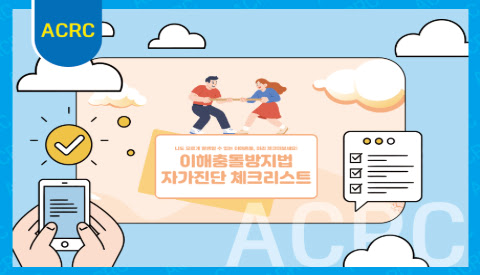“CONFLICT-OF-INTEREST STATUS CAN BE CHECKED IMMEDIATELY BY SCANNING QR CODE!”… SELF-DIAGNOSIS SERVICE BEGINS TODAY.

– ACRC launched a self-diagnosis service available on a dedicated website via QR code scan, etc. which allows for checking conflict-of-interest situations in commemoration of the 3rd anniversary of the enforcement of the Conflict of Interest Prevention Act
– From today until May 23, a voting and survey will be conducted via People’s Idea Box to pick the best word selected in “the Contest for a Word on Conflict of Interest”… participants will have a chance to be awarded a mobile gift certificate through a draw
The Anti-Corruption and Civil Rights Commission (ACRC, Chairperson Ryu Chul Whan) announced today that on the third anniversary of the enactment of the “Conflict of Interest Prevention Act for Public Officials,” a ‘Conflicts of Interest Self-Diagnosis Service’ that anyone can understand and utilize will be provided and a voting and survey related to the contest on the Conflict of Interest Prevention Act will be conducted.
The Conflicts of Interest Self-Diagnosis Service is a service that allows public officials to check for themselves whether their duties are in violation of the Conflict of Interest Prevention Act through a checklist.
When a user connects to the dedicated website by scanning a QR code, etc., and answers questions in the order of the checklist, he/she can easily confirm whether the ten categories of standards under the Conflict of Interest Prevention Act apply.
* The Conflict of Interest Prevention Act stipulates five types of reporting and submission obligations and five types of restricted and prohibited conducts that public officials must comply with to ensure the fair performance of public duties.
| Disclosure and submission of information | Restricted and prohibited conducts |
| Disclosure of privately interested persons & application for challenge | Restriction on duty-related outside activities |
| Disclosure of ownership/purchase of public duty-related real estate | Restriction on employment of family members |
| Disclosure of records of high-ranking officials’ business activities in the private sector | Restriction on private contracts |
| Disclosure of transactions with duty-related persons |
Prohibition of private use of or profiting from public institutions’ goods |
| Disclosure of personal contact with retirees | Prohibition of use of job secrets, etc. |
For example, a public official responsible for contract work can self-diagnose whether a contract he/she intend to enter into is restricted under the Conflict of Interest Prevention Act by scanning a QR code.
In addition, various participatory promotional activities are being conducted to help the public easily understand the purpose of the Conflict of Interest Prevention Act and feel the need for it.
From May 19 to 23, on the digital platform ‘People’s Idea Box’ (www.epeople.go.kr/idea), an online public vote was held to select outstanding works from the Contest aimed at encouraging awareness and adherence to the Conflict of Interest Prevention Act with phrases of around 20 characters, and mobile gift certificates were given to 100 randomly selected participants in the survey.
During the same period, a survey was also conducted to assess public awareness and the effectiveness of the Conflict of Interest Prevention Act. Mobile gift certificates were given to 100 randomly selected participants in the survey.
* Announcement of the contest’s outstanding works and the draw results for vote and prizes was made on May 30 (Friday).
Lee Myung Soon, the Vice Chairperson for Anti-Corruption at the ACRC, said, “For the Conflict of Interest Prevention Act to be more effective, the understanding and participation of both the public and public officials are crucial,” adding that “I expect that the conflict-of-interest self-diagnosis checklists are widely used so that public officials can check conflict-of-interest situations themselves as they perform their duties.”
